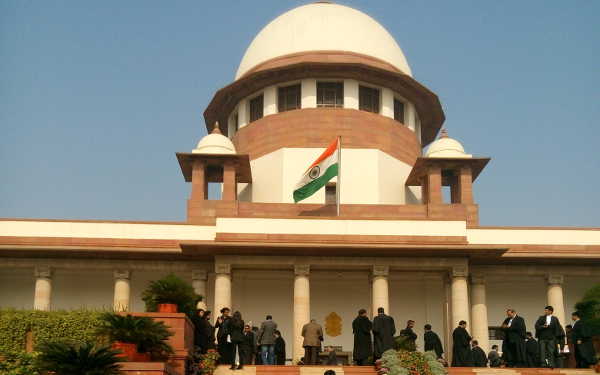
Co-Written by Snehil Kunwar Singh & Bhaskar Kumar
A Constitution bench of the Supreme Court (SC) comprising of 5-judges headed by the Chief Justice of India (CJI) Dipak Misra is examining the constitutional validity of S.497 of the Indian Penal Code (IPC). This 158-year-old criminal provision is said to be archaic which promotes gender inequality and patriarchy. It reads, “Whosoever has sexual intercourse with a person who is and whom he knows to believe to be the wife of another man, without the consent or connivance of that man, such sexual intercourse not amounting to the offence of rape, is guilty of the offence of adultery.”
This section has been challenged previously in the SC in many cases, significant ones being Yusuf Aziz v. State of Bombay, V. Rewathyv. Union of India, Sowmithri Vishnu v. Union of India, where the SC upheld the constitutional validity of the section. The SC reasoned that Art. 15(3) allows the legislature to make special provisions for women and Art. 14 allows to make classifications in pursuance of the same. It held that it being a sound classification on the grounds of sex, Art. 14 was not attracted. It was also contended that this section denies right to women to prosecute their husbands.However, the SC repelled the argument that on the ground that woman can initiate a suit for divorce on the grounds of cruelty.
It must be noted that Art. 14 allows for classification subject to the conditions that it is based on ‘intelligible differentia’ and such ‘intelligible differentia’ has a rational nexus with the object sought to be achieved. S. 497 punishes only those sexual intercourse which were without the consent of the husband. In fact, this reduces woman to chattel and the essence of the s. 497 lies in punishing those man ho invade the ‘property’ of woman. Thus, it serves to penalize the loss suffered by the husband. S.497 denies women autonomy and right of self-determination. Thus, such law which provides for classification reducing women to property of the husband is directly opposed to the concept of equality enshrined in our Constitution. It has been laid down by the SC in E.V. Chinnaihv. State of A.P. that a law can be struck down if it results in inequality.
Also, Art. 15(3) is an empowering provision which allows the legislature to make provisions for strengthening women and not to promote subservience.It has been argued on behalf of the Union of India that S. 497 serves to protect the sanctity of the marriage. However, the act of husband having sexual intercourse with unmarried woman is not penalized even though it affects the sanctity of marriage. More so when it is ground for divorce. In fact, S. 497 casts entire duty upon the women to preserve the ‘sanctity of marriage’.
In K.S. Puttuswamyv. Union of India, a 9-judge bench of the SC had unanimously held that right to privacy is a fundamental right and it encompasses within its fold decisional privacy to make intimate decisions primarily consisting one’s sexual nature. In Shafin Jahan v. Asokan N.M.(popularly known as Hadiya case), the SC held that “the choice of partner whether within or outside marriage lies within the exclusive domain of each individual…Neither the State nor the law can dictate a choice of partners or limit the free ability of every person to decide on these matters.” Thus, a law criminalizing sexual intercourse outside marriage and restricting the choice of an individual is violative of fundamental right to choice and privacy guaranteed by our Constitution.
It is also pertinent to note that 42nd Report of the Law Commission (1971) and the Malimath Committee in Criminal Law Reforms (2003) suggested that the section must be amended to the effect that both erring wife and the person who had sexual intercourse with her be held liable for adultery. It has been held by the SC in Yusuf Aziz v. State of Bombaythat S. 497 ‘protects’ women but such ‘protection’ is an example of discriminatory law which strikes upon right to equality of a married woman. However, the legislature has shown no inclination to incorporate these changes. Now that the ball is in court and S. 497 violates fundamental rights, the SC must take up the opportunity to revisit its earlier judgements on adulteryand play the role of guardian of the constitution by declaring S. 497, IPC as ultra vires of the constitution.
Snehil Kunwar Singh & Bhaskar Kumar are 2nd Year, B.A. LL.B. (Hons.) students at National Law School of India University, Bangalore











































